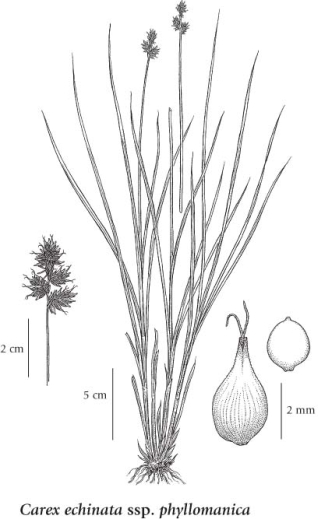Carex echinata subsp. phyllomanica Murray (W. Boott) Reznicek
coastal stellate sedge
Cyperaceae (Sedge family)
Introduction to Vascular Plants
coastal stellate sedge
Cyperaceae (Sedge family)
Introduction to Vascular Plants
Map
Distribution of Carex echinata subsp. phyllomanica
Click here to view the full interactive map and legend
Species Information
General:
Perennial, densely tufted herb from fibrous roots; stems 10-60 cm tall, about equalling the leaves, roughened above.
Leaves:
Sheaths tight, more or less red-dotted on the fronts; blades 2 to 4 per stem, flat or channelled, smooth, borne on the lower 1/2 of the stems, 0.7-3 mm wide, the lower ones reduced.
Flowers:
Spikes 2 to 7, the terminal one unstalked, 4-10 mm long, with both male and female flowers, the female flowers towards the tips, the lower spikes 1 to 4, ascending, remote, 5- to 15-flowered, with female flowers, short-stalked; bracts subtending the female spikes short to prolonged and hairlike, the latter up to 2 cm long, bladeless, the upper bracts reduced and scalelike.
Fruits:
Perigynia egg-shaped, 2.5-4 mm long, 1-1.4 mm wide, plano-convex, reflexed, appressed, or spreading, greenish-yellow to brownish, sharp-edged, with smooth margins, finely-nerved to nerveless, the beaks 1-1.5 mm long, inconspicuously bidentate; female scales egg-shaped and rounded or pointed to awned at the tips, shorter than the perigynia, yellowish-brown to chestnut brown, with greenish midribs, the margins and tips broad, bright white or narrow, opaque or dull whitish; stigmas 2; achenes lens-shaped, sharp-pointed, 1.4-2 mm long.
Notes:
Two varieties are recognized for BC :
1. Female scales rounded, chestnut brown, the margins and tips broad, bright white.............. ssp. phyllomanica (W. Boott) Reznicek
1. Female scales pointed to awned, yellowish-brown, the margins and tips narrow, opaque or dull whitish............... ssp. echinata
Illustration

If more than one illustration is available for a species (e.g., separate illustrations were provided for two subspecies) then links to the separate images will be provided below. Note that individual subspecies or varietal illustrations are not always available.
Illustration Source: The Illustrated Flora of British Columbia
Ecology
Ecological Framework for Carex echinata ssp. phyllomanica
The table below shows the species-specific information calculated from
original data (BEC database) provided by the BC Ministry of Forests and Range.
(Updated August, 2013)
The table below shows the species-specific information calculated from
original data (BEC database) provided by the BC Ministry of Forests and Range.
(Updated August, 2013)
| Site Information |
Value / Class |
||
|
Avg |
Min |
Max |
|
| Elevation
(metres) |
539 | 3 | 1800 |
| Slope
Gradient (%) |
8 | 0 | 43 |
|
Aspect (degrees) |
262 | 20 | 350 |
| Soil
Moisture Regime (SMR) [0 - very xeric; 4 - mesic; 8 - hydric] |
6 | 1 | 8 |
| Modal
Nutrient Regime
Class |
C | ||
| #
of field plots species was recorded in: |
65 | ||
| Modal
BEC Zone Class |
CWH | ||
|
All BEC Zones (# of stations/zone) species was recorded in |
CDF(2), CWH(47), ESSF(8), MH(3), MS(2), SBPS(1) | ||
|
Source:
Klinkenberg 2013
|
|||
Habitat and Range
Bogs and wet sedge meadows, open forests or sandy lakeshores and streamsides in the lowland and montane zones; ssp. echinata - frequent in S coastal BC, rare E of the Coast-Cascade Mountains N to 54degreeN; ssp. phyllomanica - common in coastal BC; ssp. echinata - circumpolar, N to AK (Aleutian Islands), E to NF and S to MA, PA, SC, IN, IA, ND, CO, UT, NV and CA; Eurasia; ssp. phyllomanica - N to AK and S to CA.Synonyms
Synonyms and Alternate Names:
Carex echinata var. phyllomanica (W. Boott) B. Boivin
Carex phyllomanica W. Boott